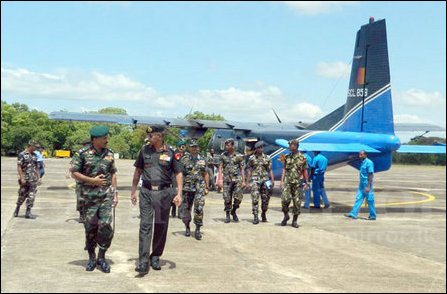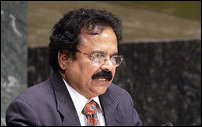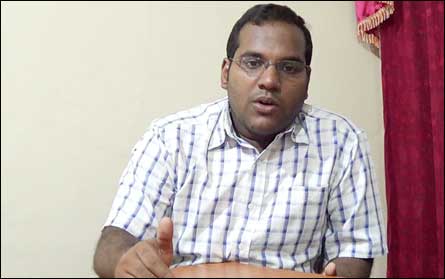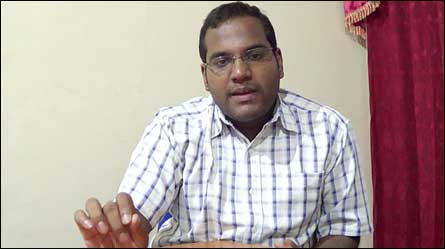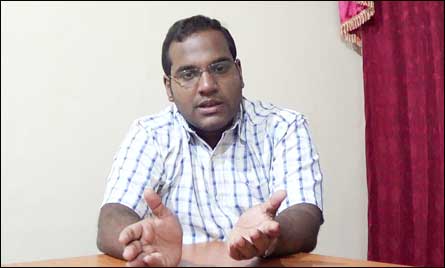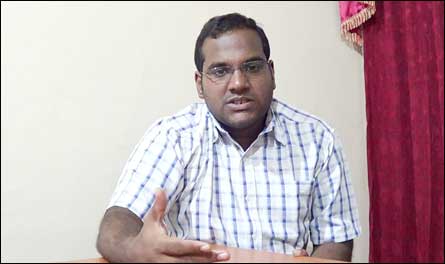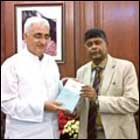Geneva basing on LLRC unfortunate, 13A never a starting point: Guruparan
[TamilNet, Thursday, 30 May 2013, 19:25 GMT]“The Geneva resolutions premising their programme of action or their
indicated programme of action on the basis of the LLRC is very
unfortunate in that they fail to understand that the LLRC is merely a
time buying process,” said Jaffna University law academic and civil
society activist Guruparan Kumaravadivel in an exclusive interview to
TamilNet this week. Answering a question on the 13th Amendment, he said,
“it is not a starting point; it is not a reference point; it is not a
basis.” The views coming from a prominent activist based in the island
gains much significance against the backdrop of orchestrations in the
diaspora defending the US-tabled, India-fine-tuned Geneva resolution,
and renewed efforts of New Delhi in invoking the zombie of the 13th
Amendment.

Guruparan Kumaravadivel
The starting point is a
pre-constitutional issue, in which the Sinhala nation has to recognise
that Tamils are a nation entitled to the Right to Self-Determination
within their traditional homeland. This recognition should have an
international underwriting, as otherwise the Sinhala-majority State
could always abrogate it, Mr Guruparan explained.
LLRC was
conceived not to resolve the problems faced by Tamils, but to delay
international action and to preserve the status quo of the State in
international arena, Guruparan said.
“Now the reason why 13th
Amendment might be talked about as a starting point is because of the
failure of the international community — failure on the part of India
and the US in particular — in their ability of extracting from this
government, from the Southern polity in general, anything furthermore,”
the civil society activist observed.
If there are people who are
looking at the 13th Amendment as a starting point, it is because of the
pressure of India and the USA on Tamils both inside and outside of the
island to be satisfied with the 13th Amendment. Particularly India may
have indicated to the Tamil political leadership in the country that the
13th Amendment is the highest benchmark in terms of what a political
solution should look like, he said.
Commenting on the so-called
‘internal self-determination’, the law academic said, “My understanding
of the Right to Self-Determination is that it cannot be split into its
internal and external forms. There is only one Right to
Self-Determination.”
“If a particular nation or a people are
recognised as having the Right of Self-Determination, it is their choice
as to how they exercise it,” he said, adding that “let the Tamil people
decide whether that right can be exercised internally.”
On
expectations about ‘regime change’ bringing in solutions, Guruparan said
that in that case solutions should have taken place long back when
there were so many regime changes in the past. What is needed is a
change in the stance of the Sinhala nation as a whole in accepting
Tamils as a nation in the island, he said.
Full text of the interview:
TamilNet:
The Tamil civil society seems to have a clear stand that neither the
13th Amendment nor 13+ could be a starting point to the resolution of
the conflict between the two nations, the Sinhala Nation and the Tamil
Nation, in the island. What is the stand of the civil society with
regards to what should be the starting-point position of the Tamil
polity in any negotiations between the two parties?
Guruparan:
We maintain that the 13th Amendment cannot be the basis for a solution;
cannot be the starting point for a resolution as well as it can’t be
part of an incremental process towards finding a solution.
This
is based on a reading of the 13th Amendment not just in terms of its
black and white contents as it is found in the Constitution, but also in
terms of the developments that have taken place since the 13th
Amendment was added to the Constitution, particularly to the case
correlating to the 13th Amendment and the practice of the 13th Amendment
in terms of the administrative and the executive practice.
It is
also because, obviously, the 13th Amendment remains within a unitary
structure, which is the bedrock of 1978 Constitution, within which we
believe no solution can be found. I don’t want to go into the details of
why the 13th Amendment is a fundamentally flawed document. I have done
it elsewhere. But, because of the reason that we think it is a
fundamentally flawed document we believe that it can’t be a starting
point or part of an incremental process.
And, that a solution to
the Tamil problem needs to start on a fresh note, on a clean slate. This
means, drafting a new Constitution.
Now, answering the question
how does the civil society, or rather myself envisage the starting
point, we believe that there is a pre-constitutional issue here.
What
do I mean by a pre-constitution issue, before the Tamil side can get
into a debate, discussion and negotiation with the Sri Lankan State?
On
the question of the kind of institutions that would accommodate the
Tamil nation within the island of Sri Lanka, the Sri Lankan State, we
believe that it is important that the southern polity, the Sinhala
Nation in particular, recognise that the Tamils are
a nation entitled to the Right to Self-Determination within their
traditional homeland. We say that this is important because the
sustainability of any institutional form or process that we come up with
in negotiating with the Sri Lankan government can only be stable if it
is based on a social contract between the different nations of Sri
Lanka, particularly the Sinhalese, Tamils and the Muslims.
Unless
the idea of the parity of status of nations coming together is the
bedrock of a new Constitution; is the understanding based on which we go
for a new dispensation of the Sri Lankan State, we believe that a
solution may not be arrived at. For example, there might be a Federal
Constitution that you can come up without actually working on the
pre-constitutional question. But, if the Sinhalese – they will continue
to remain as a 2/3 majority – if a new government comes in, and they
decide to abrogate the Constitution and repeal the Constitution, and
come up with a new one, there is nothing to stop them from doing so.
This is why we say there has to be an international underwriting to the
recognition on the part of the Sinhala Nation about the distinctiveness
of the Tamil Nation and their right to self-determination, because only
that will be the guarantee for a permanent solution to the national
question.
TamilNet:
Even the US-proposed resolution has its ‘starting point’ position
confined to the existing Sri Lankan framework, as it only calls for the
implementation of the LLRC recommendations and stops short of specifying
any framework for a roadmap to resolving the root cause. While the
Tamils have rejected the idea of considering the 13th Amendment as a
starting point for more than 26 years, there are some sections getting
deceived now that the Geneva resolution could be a starting point. What
is your stand on this?
Guruparan: The LLRC is a
document brought by the Sri Lankan government to buy more time and
space for the government on the international platform. The LLRC was
brought in, not because the drafters of the LLRC or the government that
commissioned it were serious about the problems being faced by the Tamil
people, but because they wanted that document to serve an instrumental
purpose delaying in the possible international action, particularly with
regard to international investigations for the genocide, war crimes and
crimes against humanity committed against the Tamil people, not only
during the last phase of war but also during the past 30-40 years.
So,
the LLRC, without really going into the substance of content, is very
much a tool towards preserving the status quo for the government in the
international arena and the recommendations therein are supposed to
achieve that purpose.
The Geneva resolutions premising their
programme of action or their indicated programme of action on the basis
of the LLRC is very unfortunate in that they fail to understand that the
LLRC is merely a time buying process.
It is also true that the
LLRC very much remains within the Sri Lankan constitutional framework.
It really doesn't question the nature of the Sri Lankan State itself.
Hence the kind of programme envisaged by the LLRC is more about
maintaining the status quo rather than reversing it.
Now the
reason why 13th Amendment might be talked about as a starting point is
because of the failure of the international community — failure on the
part of India and the US in particular — in their ability of extracting
from this government, from the Southern polity in general, anything
furthermore.
So, they are now trying to convince the Tamils that
they should accept something that is status quo and that we should be
satisfied with the 13th Amendment.
It also may be that,
particularly India, may have indicated to the Tamil political leadership
in the country that the 13th Amendment is the highest benchmark in
terms of what a political solution should look like.
So, owing to
these pressures, it might have been the case that both, inside the
country and outside the country, there are people who are looking at the
13th Amendment as a possible starting point.
My only request to
those people is that let a scientific, legal, constitutional reading of
the 13th Amendment be made; let us look at the contents of the 13th
Amendment not only in terms of its text, but also the subsequent
legislation and the case-flow and the practice of it and the situation
that the Tamils are in right now, and see whether the 13th Amendment is a
starting point.
My reading of it is that it is not a starting point; it is not a reference point; it is not a basis.
TamilNet:
Could you clarify your position with regards to the so-called internal
right to self-determination, which some Tamil politicians say [under the
pressure from certain Establishments of the international community]
that the Tamil polity should themselves declare that the internal right
to self-determination should be the framework under which any solution
to the national question should be found?
Guruparan:
My understanding of the Right to Self-Determination is that it cannot
be split into its internal and external forms. There is only one Right
to Self-Determination. If a particular nation or a people are recognised
as having the Right of Self-Determination, it is their choice as to how
they exercise it. Now, let the World and the Sinhala Nation recognize
that we have the Right to Self-Determination, and based on the
negotiations that we have with the Sinhala Nation mediated by the
International Community, let the Tamil people decide whether that right
can be exercised internally.
So the Tamils can’t be asked to say
that they are for the right to internal self-determination […]. Let the
Right to Self-Determination be recognised and in the process – in the
peace process and the negotiation process that ensues between the Sri
Lankan government and the Tamil side mediated by the international
community – let there a proposal come from the Sinhala Nation, as to how
we can exercise that right internally within the borders of this
island. And that sort of negotiation should lead to a new State of sorts
[…]. So let the different constituent nations within the island of Sri
Lanka then to agree to what sort of the State they want to create and in
that exercise, Tamils may decide at that point, to exercise their right
internally within the new Sri Lankan State. And it is only at that
point we can think of what sort of the exercise of the Right to
Self-Determination we want to make. We can’t make a pre-commitment on
that issue, legally speaking, politically speaking.
TamilNet:
The roadmap to the resolution of the national conflict should have
regime change, as its starting point, seems to be a message coming from
certain quarters. What is your take on this?
Guruparan:
If regime change would have delivered Tamils a solution then it should
have happened way back in the 1950s: when DS Senanayake was overthrown
by SWRD Bandaranaike and when SWRD Bandaranaike was subsequently
replaced by the UNP government, so on and so forth.
When it
comes to the Tamil national question, there is no difference between the
Sri Lanka Freedom Party (SLFP), which is now part of the alliance
called UPFA, or the UNP.
They fundamentally have very similar
positions on the national question. So, any sort of regime change really
cannot do much for the Tamil people.
What needs to be
recognised is that this is not a real question of a problem with a
particular government, but this is problem between two different nations
within Sri Lanka and that the way to go about resolving it is to see
how the Sinhala Nation comes around to recognise Tamil nationhood,
Self-Determination and our traditional homeland.
What is the guarantee that the regime change would actually look at these things positively and deliver on them?
Anyway,
a particular regime coming and delivering them is not important. What
is important is that there needs to be a change of stance in the Sinhala
Nation as a whole, if this problem is to be resolved.


